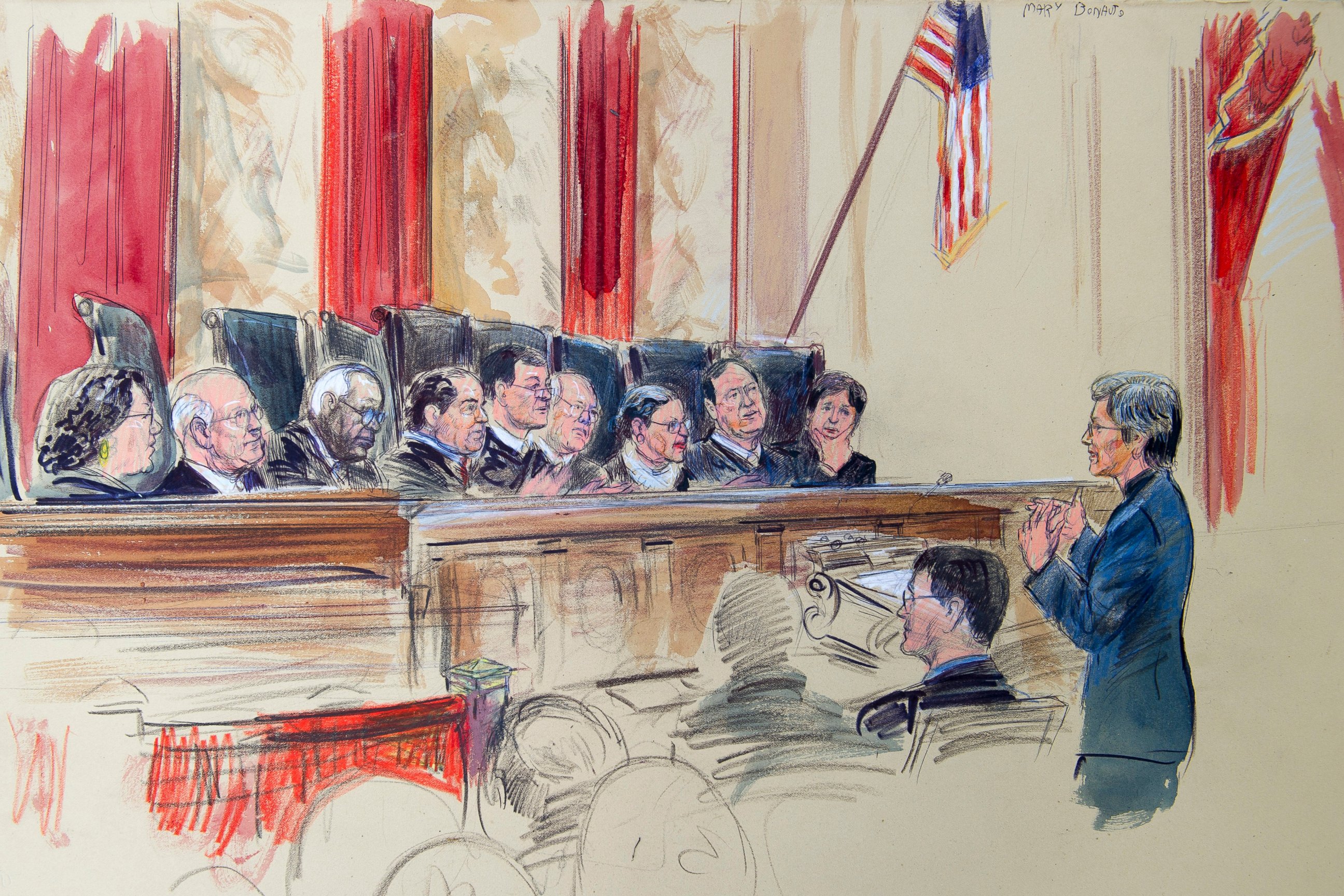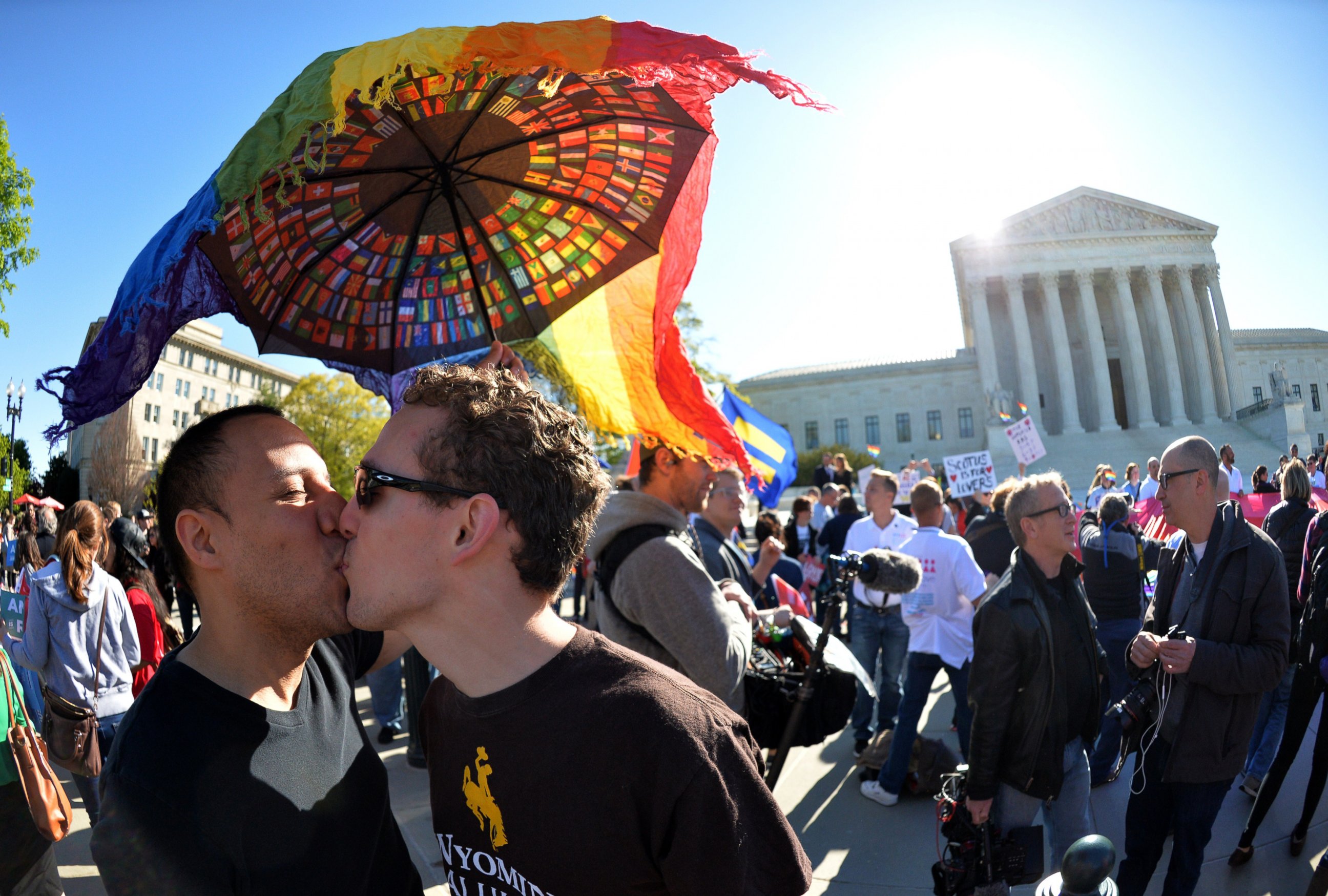Gay Marriage Questions the Supreme Court Must Consider
Here are the key questions the court will weigh in deliberating on the case.
The Supreme Court grilled lawyers arguing for and against same-sex marriage today about two questions:
— --
- Does the Constitution require all states to offer marriage licenses to same-sex couples?
- If not, does the Constitution require states to recognize the marriage rights of same-sex couples who are already married?
The part of the Constitution that could potentially require these things is the 14th Amendment:
"No State shall ... deprive any person of life, liberty, or property, without due process of law; nor deny ... the equal protection of the laws."
To non-lawyers, that sounds like a strange place to look for gay marriage, but it’s the same part of our founding document the court used to strike down sodomy laws, and restrictions on abortion.
Fortunately, there’s a very clear question that the Supreme Court’s case-law requires the justices to ask when they’re deciding whether a state law is constitutional:
“Is it plausible that the state that passed the law had a ‘rational basis’ for doing so?”
If so, then the law should pass muster.
In recent years, though -- without quite acknowledging they were doing it -- the court has tended to ask more difficult questions when a law affects gays and straights differently.
That is: What about the actual reason a state passed, or is keeping, the law? Is that rational, or is the reason the state is claiming just a pretext for discrimination?

Which of those questions is the one the court should use was the subject of much debate today, because the level of scrutiny the justices put state traditional-marriage laws under could determine the outcome of the case.
For example:
The case in front of the court today involves Michigan asserting the right to continue denying marriage and adoption rights to a Michigan lesbian couple with four adopted children. The liberals want to force Michigan to prove it has an actually rational reason for doing so, not just that it can articulate any old reason.
Justice Elena Kagan asked the lawyer for Michigan if he thought that Michigan allowing gays to marry would hurt its attempts to encourage straight people to have kids.
The lawyer, John Bursch, at first responded, “We are saying that, your honor--” but then he interrupted himself and said, “Now, obviously, under a rational basis, that's not a question that you need to decide.”
Later, another liberal, Justice Sonia Sotomayor asked, “How does withholding marriage from one group, same-sex couples, increase the value to the other group?”
Bursch began to answer, but Justice Antonin Scalia interrupted: “Excuse me. Do you have to answer that question?”
Bursch accepted the help.
“Under rational basis, we don't,” he said.
Justice Scalia continued, “I thought your burden was simply to show that the state's reason for this institution is a reason that has nothing to do [with prejudice against] same-sex couples.”
It was the same “rational basis” question that prompted a long discussion of the marriage practices of Ancient Greece!
Justice Samuel Alito, perhaps inspired by the same argument made by scholars Ryan Anderson and Sherif Girgis in their book, "What Is Marriage?" suggested that prejudice wasn’t necessarily behind states’ anti-gay-marriage laws: Take ancient Greece, for example. Classical Athens did not look down on homosexuality, and yet marriage there was nonetheless only between a man and a woman. In Justice Alito’s view, if there is a valid, rational reason for a state law barring gay marriage, the court has to uphold that law.
The rational basis question was also behind the long conversation about how “new” same-sex marriage is. If it’s a new institution and nobody knows how it will affect child-rearing and the larger institution of marriage, then isn’t it entirely rational for some states to ban it and others to permit it? That’s why it made many same-sex-marriage proponents nervous that Justice Kennedy began his questioning by saying,

Kennedy was suggesting that that’s how long traditional marriage has been around for, compared to just a few years for same-sex marriage.
Justice Ginsburg, however, said that the relevant comparison was how long modern, egalitarian marriage has been around for, which she dated only to 1982.
“[O
Finally, it’s worth noting that rational basis is crucial to understanding the difference between the first question the court is considering -- Does the Constitution require states to issue marriage licenses to gay couples? -- and the second: Does the Constitution require states to recognize gay marriages consecrated in other states?
Douglas Hallward-Driemeier was the lawyer arguing that even if the Constitution doesn’t require gay marriage, it does require marriage-recognition. He made clear he thought there was a constitutional right to gay marriage -- but just in case, he also argued that something more than the rational basis question should be asked for his clients.
Driemeier said it should be harder for states to take away rights that people already have than it is to deny them the rights in the first place. And in this case, his clients are already married! He cited Justice Kennedy’s gay-rights opinion, saying:
Once you’re relying on marriage rights one state has granted you, Driemeier suggested, something more than rational basis -- either Scalia’s or Kagan’s version -- should apply.
So these two questions will likely determine who wins and who loses in June:
- Does the court ask the liberals’ or the conservatives’ version of the rational basis question about gay marriage?
- If they ask the conservatives’ version, is that also the right question for determining whether states have to recognize marriages from other states?



